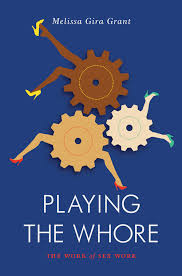Playing the Whore: The Work of Sex Work by Melissa Gira Grant
Written by Ashley Kelmore, Posted in Feminism, Politics, Reviews
Four Stars
“Sex work can indeed be empowering. But that is not the point. Money is the fucking point.”
– Melissa Gira Grant, Playing the Whore
Growing up I had three basic images of sex work (although I didn’t call it that then): the Julia Roberts / Pretty Woman version; the desperate, drug addicted woman; and the ‘sex slave’ in another country who was ‘rescued’ regularly on Dateline and 48 Hours. I didn’t spend time thinking about sex workers, but I did wonder why sex work was illegal in most places.
Recently I’ve become more interested in labor rights; specifically how society views certain types of labor as worthy (of money or legality) and others as deserving of criminalization or at least disdain. I live in Seattle, where the fight to raise the minimum wage to $15 an hour was met with such charming arguments from non-shift workers as ‘what did a McDonald’s worker do to deserve that? I barely make that!’ as though people in the fast food industry aren’t working just as hard as people sitting in air conditioned offices, able to take coffee and bathroom breaks whenever they want.
This interest led me to Ms. Grant’s book. She takes a perspective that is missing in coverage of sex work and workers – one that does not start by asking ‘should people do sex work’ but instead asks what can we do to improve the lives of the people who work in that industry. The book is well-written and educated me on the topic, but when asked to describe it in a few sentences I have a hard time. Each chapter feels like a separate essay in a broader collection, and initially I was not sure of the main purpose of the book, as it covers a broad area. It is not a linear history of sex work, nor is it an argument (primarily) for the decriminalization or legalization of sex work. It is more than that.
Going back through my notes and rereading the portions I highlighted does bring more clarity to me. That is a function not of Ms. Grant’s writing, but of my need to re-read the book to better take in all of the information she shares. Her purpose seems to be to point out all of the ways in which people who seek to help sex workers fail, and in doing so Ms. Grant draws the reader’s attention to the need for the reader to take actions in solidarity with these workers, and support those who can change the conditions of their lives for the better, not pull them out of sex work or make it more dangerous for them to perform the work they do.
Ms. Grant illustrates this in many ways, including critiquing the fight against online posting of sex worker ads and the large anti-sex work organizations that purport to rescue sex workers from horrible conditions. Ms. Grant points out that so many of the ‘rescued’ end up in worse situations, with less agency than they had when doing sex work, and concludes that this stems from the inability of so many to see these women and men as people doing a job and not as one-dimensional ‘whores.’
“The goal, these antiprostitute advocates say, of eradicating men’s desire for paid sex isn’t ‘antisex’ but to restore the personhood of prostitutes, that is, of people who are already people except to those who claim to want to fix them.”
That’s the point, really. Sex workers are people first, people who make their money in the sex work industry. The problems these workers face doesn’t stem from the morality of sex work – they originate with the rest of society, which is invested in making sex work dangerous. The question the reader is left with – that I am left with – is what am I going to do to benefit these workers?

